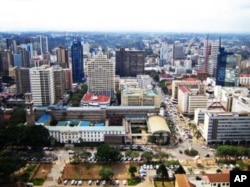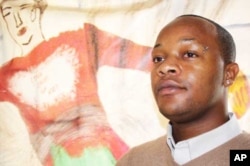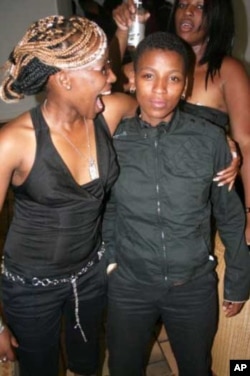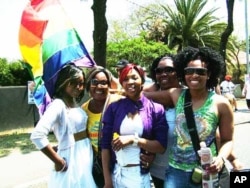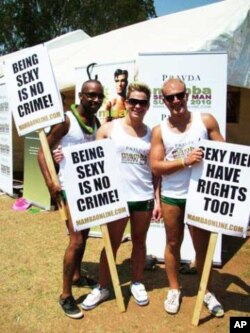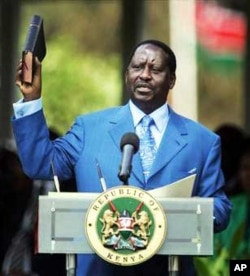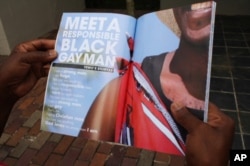Part 2 of a 5 part series: Gays in Africa
1 | 2 | 3 | 4 | 5
Greasy cheese, pasta and minced meat splatter onto a table in a shabby restaurant in Nairobi’s city center. Charles Ichuliza is coughing and spluttering into his meal after being asked to give his views on homosexuals.
Abandoning a steaming plate of spaghetti and sauce, the young businessman seethes and says, “Gays! I hate them, I hate them; I hate them! I really hate them. Because Why? God said a woman should marry a man, not a man to marry a man. They will be punished for what they are doing.”
A few miles away, David Wathira drives his taxi through Nairobi’s Westlands suburb. Music pounds from an old radio and a plastic figurine of a beatific, blonde, blue-eyed Jesus swings from a rear-view mirror. Wathira’s adamant that homosexuality – which he constantly refers to as a “habit” – is “not the normal African way.”
He says, “Kenyans, like all Africans, believe in relationships with people of the opposite sex. Gays here are just outcasts.”
Like Ichuliza, Wathira points to the Bible for justification for his views.
“You remember when it was this Sodom and Gomorrah? Gays were finished by fire because God was angry with them,” he says, adding, “According to any culture, (homosexuality) is immoral.… It shows that somebody is lacking something.”
Nancy Githui, a hairdresser in Kenya’s capital, says gay people have same-sex relationships “because they want to taste something different, to taste something funny. What angers me is that they want others to follow in their footsteps. That is why they call their sexual behavior natural, when it is actually totally unnatural.”
Discrimination in Kenya
Denis Nzioka lives in Nairobi and is one of East Africa’s most prominent gay rights activists. He works for a variety of NGOs, including the Gay and Lesbian Coalition of Kenya and the Gay Activists Alliance of Africa.
Nzioka says opinions like those of Ichuliza, Wathira and Githui have always been popular in Kenya. But – fueled by some politicians, religious leaders and “cultural bigots” – he says homophobia’s becoming “much more” common in the country.
“We have had (recent) cases of police beating up gay people. We have had gay parties being raided by police, or any effeminate guy – maybe in a club – being thrown out by bouncers or the police being called to arrest this person,” Nzioka says. “We also have cases of gay people being blackmailed. I know of one well-known Kenyan who has paid blackmailers 200,000 Shillings (about US$ 2,500) to prevent him being exposed as a homosexual.”
According to Nzioka, some Kenyan health institutions are also homophobic. “We’ve had cases of homosexuals being infected with anal and oral gonorrhea and going to the hospital where doctors refused to treat them,” he says.
He says homophobia is very prevalent in Kenya’s schools. “We often hear of cases of gay students being discriminated against by fellow pupils and even teachers,” he says.
And in Kenya’s streets, the insults persist. “Homophobes shout at you, ‘You fag! Homo! You prostitute! You are evil; you are immoral. You are worse than pigs; you are just dogs,” says Nzioka.
He says Kenyan street gangs often target gays. “Some of these youths maybe throw stones at you (and) write (discriminatory) things on your (home’s) wall. If you’re staying with your parents and you come out gay, your parents also suffer, your family suffers.”
But Nzioka also says families are the “main [source of] discrimination” against Kenya’s homosexuals. “Many Kenyans are exposed as gays and then their families, on who they mostly depend for their material needs, reject them, leaving them destitute,” he says, adding that because of “isolation and loneliness,” many gay Kenyans abuse drugs and commit suicide.
14-year jail sentence
Nzioka’s convinced Kenya’s law is one of the causes of widespread homophobia in the country. “The law criminalizes anal sex. If you’re found to have had it, you can be sent to jail for 14 years.…”
Kenyans found guilty of sodomy, he explains, are usually fined and not imprisoned. But, adds Nzioka, “When you have a repressive law like that on the statute books, it fans the flames of hatred. It makes people think it is fine to discriminate against homosexuals and even to kill and beat them.”
As in some other African countries, lesbianism is legal in Kenya. Nzioka says this is because same-sex relationships between women don’t threaten the “alpha male culture in Kenya. This country is so patriarchal. Women, even if they are lesbians, are simply ignored.”
But in the recent past Kenyan police have arrested some lesbians for “public indecency” or “gross misconduct” – a strategy, says Nzioka, for the police to collect bribes. “The cop will say, ‘You know what, there is no need of taking this to the court. Just give me 5,000 or 10,000 (Kenya Shillings) and we’ll sort this out.’”
He says most of these women, “fearing public shame,” pay the bribes. “So lesbianism in Kenya is covered up,” says Nzioka. “That is one of the reasons why it has been so hard to collect statistics on women who have sex with women in Kenya and the HIV prevalence among this group.”
High-profile religious criticism
But it’s religion that Nzioka describes as the “number one” reason for anti-gay feeling in Kenya. He explains that Christianity and Islam play “very big roles” in most Kenyan’s lives, with churches and religious leaders having “great power.”
“All the…religions condemn homosexuality in any form.… So you have these preachers, these bishops, these televangelists, gaining massive followings by violently attacking homosexuals in their sermons,” Nzioka says.
He tells how some Kenyan religious leaders have blamed the country’s gays for natural disasters, saying events like drought are God’s punishment for Kenyans having same-sex relationships. Some Kenyan religious leaders have also organized public protests against gays.
“Here we have actually had religious leaders visiting gay people’s homes and shouting to the public, ‘This is an evil homosexual house!’”, Nzioka exclaims. “And it’s a bishop, it’s an imam, it’s a sheikh, and they’re the ones leading the people (against gays). So religion is fueling homophobia, is instigating violence, is instigating discrimination.”
Sometimes, he says, Kenyan religious “zealots” are even more overt in their actions against the gay community. Last year, police arrested an evangelical preacher with some grenades in his possession. The suspect told police he intended to bomb the Gay and Lesbian Coalition’s office in Nairobi.
“He actually said that he was going to kill homosexuals. And he was asked, for what reason? (He replied) ‘Oh, God said; God said that homosexuals should be killed’.… It’s very shocking, and it’s actually a bomb! It’s not like it’s a knife or a stone.…” says Nzioka, continuing, “So now there’s constant paranoia here. We are never sure when a parcel arrives that it is not a bomb. When we leave the office, we are aware that we may be attacked at any time by some homophobic maniac. It’s very, very scary.”
Religious movements and African religious leaders deny they’re inciting hate crimes against homosexuals. They say they encourage an attitude of “love the sinner but hate the sin.”
‘It is against African tradition’
Nzioka says Kenyan politicians are also “whipping up emotions” against homosexuals. Former president Daniel arap Moi has declared, “(Homosexuality) is against African tradition and biblical teachings. I will not shy from warning Kenyans against this scourge.”
And late last year Kenyan Prime Minister Raila Odinga called for the arrest of gays and lesbians found to be engaging in same-sex relations.
Nzioka says, “These statements by powerful politicians who are very respected in Kenya have the same effect as the statements made by religious leaders – they sanction attacks on gay people.”
Many Kenyans, he explains, also regard homosexuality as an “erosion” of their culture as they see it as “western influence” and see local gays as “pawns” of gay rights groups in America and England.
“Most Kenyans insist that homosexuality never happened in their culture. They’ll say things like, ‘I am a Kamba; Kambas never have that.’ Or, ‘I am Luo; I am Kikuyu; that is not in our culture,’” says Nzioka. “And…you’re like – ‘Duh! I am gay; you cannot say (homosexuality) is un-African and yet here I am – Kamba, I am African, and I am gay!’”
Death threats
Nzioka himself has received death threats as a result of his advocacy for gay rights. But he refuses to quit his work. “Even if they kill me, me I’m not worried. I’m ready to die as a martyr,” he states. Then he adds, laughing, “I just wish they’ll make it swift – maybe (by means of) a gun. Not stones – a gun. A gunshot to the heart - that’ll be good …”
He maintains he’ll continue to try to socialize with “even the most violent of homophobes, trying to convince them – through talking to them and laughing with them – that gay people are human beings, just like them.”
Nzioka insists he won’t deviate from his principles - even if it means he one day pays the ultimate price. “So be it,” he whispers. “It’s in God’s hands,” he smiles.




